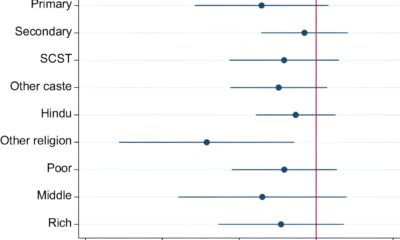Health
A healthy lifestyle can compensate for ‘unlucky’ genes, research shows

A healthy lifestyle can negate roughly 60% of the impact of ‘life-shortening’ genes. … [+]
Some people still live to be 100 years or older. Others are not so lucky. What separates the two groups? Part of the answer comes down to simple luck: we know that genes play a prominent role in shaping lifespan. For some this means they are naturally predisposed to living longer, while for others it means an uphill battle.
But the good news is that lifestyle choices (the daily decisions you make about diet, exercise, and more) have a say, too. In fact, a healthy lifestyle can negate roughly 60% of the impact of ‘life-shortening’ genes, potentially extending your life by an additional five years. These are the findings of a new, large-scale study published in the British medical journal.
Big data, big findings
To study how lifestyle and genetics interact to influence lifespan, the researchers collected relevant genetic, biological and health data from 353,742 participants. They then monitored their health for about 13 years.
Based on their complete genetic information, including the presence of any protective or deleterious variants, participants were placed into one of three lifespan categories: those whose genes extended lifespan (20%), those whose genes suggested an intermediate lifespan (60% ), and those whose genes make them short-lived (20%).
In addition to the genetic categories, the researchers also placed each participant into a lifestyle score category: favorable (23%), moderate (56%), and unfavorable (21%). Lifestyle scores were calculated based on people’s sleep habits, whether and how much they drank or smoked, what types of food they ate and whether or not they were physically active. The optimal combination for longevity includes never smoking, regular exercise, a healthy diet and adequate eight hours of sleep.
The findings showed that people with a genetic predisposition for a short life are 21% more likely to die early than those with favorable genes. And this was true regardless of lifestyle decisions. Yet people with life-shortening genes can gain a lot by living healthily: they can offset the effects of the genes by more than 60%, potentially adding up to five extra years to their lives.
On the other hand, people with unhealthy lifestyles were 78% more likely to die prematurely, regardless of their genetic status. Even the most favorable genes cannot protect against poor lifestyle choices.
Piling an unhealthy life on top of unfavorable genes represented the worst of all possible outcomes, more than doubling the risk of early death compared to people with nutritious lifestyle habits and protective genes for longevity.
Takeaways
While we have no say in the genes we are given, we do have some say in the way we choose to live our lives. This study makes it clear that such lifestyle choices play a major role in shaping longevity. And while a set of lucky genes can give you an edge, any advantage can just as easily be undone by a questionable lifestyle. Fortunately, the reverse also applies: you can counteract the effects of unfavorable genes by living a healthy life. This reduces your risk and extends your life.
From the perspective of healthcare systems, it is clear that we need to invest in policies that encourage healthy living. As always, an ounce of prevention is worth a pound of cure. But it should also go without saying that nothing happens in a vacuum.
For many, even if they want to make healthy choices, living in a food desert is simply not possible, they do not have easy and affordable access to exercise facilities, and they are priced out of health insurance. A long and healthy life should not be behind one paywall. We need to start thinking of health and longevity as social issuesand not merely individual choices.













